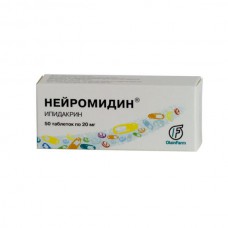Expiration date: 10/2028
Active substance: Ipidacrine
Pharmachologic effect: anticholinesterase
Pharmacodynamics
Neuromidin ® has a direct stimulating effect on the conduct of the pulse along the nerve fibers, interneuronal and neuromuscular synapses of the CNS and peripheral nervous system. Pharmacological action Neuromidin® based on a combination of two mechanisms of action: blockade of potassium channels of the membrane of neurons and muscle cells; reversible inhibition of cholinesterase in synapses.
Neuromidin® enhances the effect on smooth muscle acetylcholine not only, but epinephrine, serotonin, histamine and oxytocin.
Neuromidin® has the following pharmacological effects:
- Improve and stimulate impulse conduction in the nervous system and neuromuscular transmission;
- Enhances contractility of smooth muscle organs under the influence of acetylcholine agonists, adrenaline, serotonin, histamine and oxytocin receptors, with the exception of potassium chloride;
- Improves memory, slows progressive course of dementia.
In preclinical studies Neuromidin® not teratogenic, embryotoxic, mutagenic, carcinogenic and immunotoxic action, had no effect on the endocrine system.
Pharmacokinetics
Once inside, in / m or s / c administration is rapidly absorbed. Cmax plasma levels achieved after 1 h after oral administration and 25-30 minutes after i / m and s / c administration. Binding to plasma proteins - 40-50% active. Rapidly enters the tissue poluraspredeleniya period of 40 min. It is metabolized in the liver. Excreted through the kidneys (mainly by tubular secretion and only 1/3 - by glomerular filtration) and extrarenal (through blood). T1 / 2 Neuromidin® on parenteral administration is 2-3 hours. After parenteral administration, 34.8% of the dose of the drug is excreted in the urine in unchanged form.
Testimony
- peripheral nervous system diseases (mono- and polyneuropathy, poliradikulopatiya, myasthenia gravis and the myasthenic syndrome of various etiologies);
- CNS disorders (bulbar paralysis and paresis, a recovery period of organic CNS lesions accompanied by motor and / or cognitive impairment);
- bowel atony (treatment and prevention) (optional for tablets).
Contraindications
- hypersensitivity to any component of the drug;
- epilepsy;
- extrapyramidal disease with hyperkinesis;
- angina;
- bradycardia;
- bronchial asthma;
- Mechanical bowel obstruction or urinary tract;
- vestibular disorders;
- gastric ulcer or duodenal ulcer in the acute stage;
- Pregnancy (drug increases the tone of the uterus);
- lactation;
- Children up to age 18 years (there are no systematic data on the application).
Precautions: gastric ulcer and duodenal ulcer, thyrotoxicosis, diseases of the cardiovascular system, as well as patients with obstructive diseases of the respiratory system, or a history of acute respiratory diseases.
In addition to tablets
Precautions: When lactase deficiency, lactose intolerance, lactose malabsorption syndrome / isomalt, because of the drug includes lactose.
Side effects
It causes excitation of m-cholinergic receptors: salivation, sweating, palpitations, nausea, diarrhea, jaundice, bradycardia, epigastric pain, increased allocation of the bronchi secretion, bronchospasm, seizures. Drooling and bradycardia can be reduced m-holinoblokatorami (atropine, etc.). Increased uterine tone, skin allergic reactions.
Rarely (after higher doses) observed dizziness, headache, chest pain, vomiting, weakness, drowsiness, skin reactions (itching, rash). In these cases, reduce the dose or short-term (1-2 days) interrupt drug. These side effects occur in less than 10% of patients.
Interaction
Neuromidin® enhances the sedative effect in combination with the means, oppressive central nervous system.
The action and the side effects are enhanced when used together with other cholinesterase inhibitors and nicotinic-m means. In patients with myasthenia increases the risk of cholinergic crisis, if used in conjunction with other Neuromidin® cholinergic agents.
The risk of bradycardia when ?-blockers were used prior to the treatment with Neuromidin®.
Neuromidin® be used in combination with a nootropic drug.
Alcohol increases the side effects of the drug.
It weakens the inhibitory effect on neuromuscular transmission and conduction of excitation along the peripheral nerves of local anesthetics, aminoglycosides, potassium chloride.
Dosing and Administration
Inside, c / or / m. Dose and duration of treatment is determined individually depending on the severity of the disease.
Pills
Peripheral nervous system diseases:
- Mono- and polyneuropathies, poliradikulopatii, myasthenia gravis, myasthenic syndrome and various etiologies - 10-20 mg (see Table 0.5-1.) 1-3 times a day. The treatment is 1 to 2 months. If necessary, treatment can be repeated several times with a break between courses of 1-2 months;
- To prevent myasthenic crises, severe violations of neuromuscular conduction briefly parenterally administered 1-2 ml (15-30 mg) Neuromidin® 1.5% solution for injection, and then continue treatment Neuromidin® tablets, the dose can be increased to 20-40 mg (Table 1-2.) 5 times a day.
Diseases of the central nervous system: bulbar paralysis and paresis, a recovery period of organic CNS lesions (traumatic, vascular or other origins), accompanied by motor and / or cognitive impairment - 10-20 mg (. Table 0.5-1) 2-3 times day. The course of treatment from 2 to 6 months. repeat the treatment if necessary.
Treatment and prevention of intestinal atony - 20 mg (Table 1). 2-3 times a day for 1-2 weeks.
Solution for i / m and n / to the introduction
Peripheral nervous system diseases:
- Mono- and polyneuropathy of various origins - n / a or / m 5-15 mg 1-2 times a day, the course - 10-15 days (in severe cases - up to 30 days); Further treatment should be continued tablet form of the drug;
- Myasthenia gravis and myasthenic syndrome - n / a or / m 15-30 mg 1-3 times a day with the further transition to a tablet form. The total course of treatment is 1-2 months. If necessary, treatment can be repeated several times with a break between courses of 1-2 months.
Diseases of the central nervous system:
- Bulbar paralysis and paresis - n / a or / m 5-15 mg 1-2 times a day for 10-15 days; when switching to a tablet form;
- Rehabilitation with organic CNS lesions - a / m 10-15 mg 1-2 times a day, the course - up to 15 days, then, if possible, switch to tablet form.
If the next dose is not accepted in time, it does not take further.
The maximum daily dose - 200 mg.
Overdose
Symptoms: loss of appetite, bronchial spasm, lacrimation, sweating, pupillary constriction, nystagmus, increased motility of the gastrointestinal tract, spontaneous defecation and urination, vomiting, jaundice, bradycardia, a violation of intracardiac conduction, arrhythmias, lowering blood pressure, restlessness, anxiety, agitation, anxiety, ataxia, seizures, coma, speech disorders, drowsiness, weakness.
Treatment: symptomatic therapy is used, appoint Mr. holinoblokatory (atropine, tsiklodol, metacin et al.).
Special instructions
There are no systematic data on the use of the drug in children Neuromidin®.
At the time of treatment should be deleted alcohol (increases the side effects of the drug).
Effects on ability to drive or to perform work requiring higher rate of physical and mental reactions. During treatment should refrain from driving a car, as well as the classes of potentially hazardous activities that require high concentration and speed of psychomotor reactions.
Release Form
Tablets, 20 mg. According to Table 10. in blisters made of PVC foil and aluminum foil. On 5 contour cell packages in a pack made of cardboard.
A solution for intramuscular or subcutaneous administration, 5 mg / ml and 15 mg / ml. 1 ml of the drug in neutral glass vials (type I). On 5 amp. in blisters of PVC film. 2 blisters in a pack made of cardboard.
For the drug, produced by JSC "Sopharma", Bulgaria: 10 amp. in blisters of PVC film. On 1 contour cellular packaging in the stack of cardboard.
Manufacturer
"Olainfarm" JSC. Str. Rupnitsu 5, Olaine, LV-2114, Latvia.
Storage conditions:
In a dry, dark place at a temperature no higher than 25 ° C.
Keep out of the reach of children.
Shelf-life: 5 years.
Do not use beyond the expiration date printed on the package.





